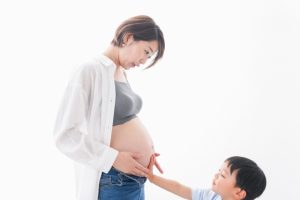Summary of this article
Symptoms in early pregnancy can be similar to PMS (premenstrual syndrome), and both are considered to be caused by progesterone (luteinizing hormone). The difference between early pregnancy and PMS is that with PMS, menstruation begins immediately and the PMS symptoms subside. However, if the symptoms are those of early pregnancy, they will then transition to morning sickness and other pregnancy symptoms.
- Introduction
- What is the difference between very early pregnancy symptoms and PMS
- What is the difference between early pregnancy symptoms and PMS
- What is the condition of the baby in early pregnancy? How big is the mother’s uterus?
- How do you spend your first trimester?
- What you can do for a healthier pregnancy
Introduction
For those who have been hoping to become pregnant, the announcement from the doctor that they are pregnant is a very happy occasion. However, at the same time, many people feel great anxiety about the risk of miscarriage, premature birth, the health of the fetus, etc.
During early pregnancy, hormone balance changes drastically, which has a significant physical and mental impact. Although it varies from person to person, the main mental symptoms of early pregnancy are irritability and depression, while physical symptoms include fatigue, breast tenderness, and abdominal pain.
These early pregnancy symptoms are similar to PMS (premenstrual syndrome), and both are caused by the influence of progesterone (the luteal hormone), but there are clear differences between early pregnancy symptoms and PMS.
In this article, we will explain the difference between early pregnancy symptoms and PMS, and how to spend your time from the very early stages of pregnancy to the early stages of pregnancy. Learn about the unstable period that many pregnant women experience, and spend a stress-free and healthy pregnancy.
What are the differences between early pregnancy symptoms and PMS?
The very early stages of pregnancy are not a medical term but the period from the last menstrual period until pregnancy (implantation) is established, and generally refer to the second to third week of pregnancy. The very early symptoms of pregnancy refer to symptoms that occur before and after implantation, and symptoms similar to PMS appear, such as hot flashes and a small amount of bleeding that occurs at the time of implantation.
Implantation bleeding, which occurs in the very early stages of pregnancy, does not occur in all pregnant women. The amount of bleeding is also very small, and the bleeding period is short, about 1 to 3 days. PMS then leads to menstruation, so there may be clot-like menstrual blood, but implantation bleeding does not cause such bleeding.
What is the difference between early pregnancy symptoms and PMS?
Early pregnancy refers to the period up to 13 weeks and 6 days.
Symptoms of early pregnancy vary from person to person, but the most common symptoms are listed below. It is said that many symptoms similar to PMS are due to the influence of progesterone (luteal hormone).
- Delayed menstruation
- Breast swelling, pain
- Body flushing, fatigue
- Changes in smell and taste
- Morning sickness (nausea and vomiting)
- Mentally unstable (irritable, depressed, easily moved to tears, etc.)
- Drowsiness
- Frequent urination
- constipate
- lower back pain
- Increased vaginal discharge
The number of weeks of pregnancy is counted from the first day of the last menstrual period as week 0, day 0 of pregnancy. In other words, week 0 of pregnancy is during menstruation. When the fertilized egg implants and pregnancy is established, the pregnancy is counted as being between 2 and 3 weeks. Since the next menstrual period is due in the 4th week, many women will realize they are pregnant when their period is delayed from around the 4th week. Pregnancy tests can be used from one week after the expected date of menstruation (5th week of pregnancy).
During early pregnancy, the hormones progesterone and estrogen increase. Progesterone and estrogen are important hormones for maintaining pregnancy, but it is said that these hormones are the cause of various symptoms of early pregnancy.
Progesterone is also said to be the hormone that causes PMS. In the early stages of pregnancy, when progesterone levels rise rapidly, it can cause physical symptoms similar to PMS, such as breast tenderness, pain, strong drowsiness, fatigue, and lethargy, as well as mental symptoms such as depression, irritability, anxiety, and tearfulness.
In the early stages of pregnancy, progesterone keeps the temperature high to maintain the pregnancy, which is what makes you feel hot and tired.

The difference between early pregnancy and PMS is that with PMS, menstruation will start soon and the PMS symptoms will subside, but with early pregnancy symptoms, they will then progress to pregnancy symptoms such as morning sickness.
Morning sickness is one of the most common symptoms of pregnancy. Although it varies from person to person, it usually begins at 5-6 weeks of pregnancy, peaks at 8-10 weeks, and then subsides at 12-16 weeks.
Estrogen has the effect of increasing vaginal discharge. Generally, watery vaginal discharge tends to increase as the pregnancy progresses.
From early pregnancy, the uterus and baby grow day by day, which puts pressure on the bladder, reducing its capacity and causing a strong urge to urinate. In addition, the amount of urine increases and the frequency of urination increases as the fluid in the body increases and kidney function improves.
Once pregnancy is confirmed and the uterus begins to grow, back pain is more likely to occur. This is thought to be because hormones such as relaxin, estrogen, and progesterone loosen the pelvic joints and ligaments in preparation for childbirth. The sacroiliac ligaments and pubic symphysis loosen, putting strain on the muscles of the back and lower back, causing pain.
During pregnancy, intestinal movement becomes poor due to the influence of progesterone. This hormone causes muscle relaxation, which slows down intestinal movement and results in symptoms such as hard stools and easy gas. Constipation can also be caused by not being able to push hard because you are worried about the baby, or by reducing your water intake due to frequent urination. Another cause of constipation is the pressure on the large intestine caused by the uterus growing as the weeks go by. If you are constipated during pregnancy, do not use over-the-counter medications on your own, but be sure to consult a doctor.
NIPT (new prenatal testing) that can be performed during early pregnancy
Many pregnant women tend to become mentally unstable during the early stages of pregnancy due to changes in hormone balance. It is important to maintain a good living environment and spend each day peacefully as much as possible. In addition, in older pregnancies, the risk of chromosomal abnormalities in the fetus increases, which often leads to miscarriage or premature birth.
In recent years, it has become possible to detect the risk of fetal chromosomal abnormalities in the early stages of pregnancy. With NIPT (non-invasive prenatal testing), it is possible to check the risk of fetal chromosomal abnormalities by simply taking a blood sample from the mother, and it is a less invasive (damaging) test to the mother and fetus than previous prenatal tests such as chorionic villus sampling and amniocentesis. NIPT (non-invasive prenatal testing) can be performed from around the sixth week of pregnancy (when pregnancy is confirmed by ultrasound) and as early as the early stages of pregnancy. If you are worried about the baby’s health or miscarriage and are causing a lot of stress, it may be an option to consider testing.
What is the condition of the baby in the early stages of pregnancy? How big is the mother’s uterus?
Once pregnancy is established, your baby will grow day by day from an embryo to a fetus, and most of its body parts will be developed during the first four months of pregnancy.
2nd month of pregnancy (4th to 7th week)
Height: Approx. 0.4cm to 1.2cm Weight: Approx. 1g to 4g
The head, torso, limbs, eyes, ears, mouth, and teeth begin to form. The central nervous system, heart, and lungs begin to form. From around the 6th week, a heartbeat can be detected by ultrasound.
The mother’s uterus grows to a size slightly larger than a chicken egg (8-9cm).
*The size of a non-pregnant uterus is the size of a chicken egg (6-8cm).
3rd month of pregnancy (8th to 11th week)
Height: Approx. 1.8cm to 6cm Weight: Approx. 5 to 12g
The fingers and toes begin to separate, and the baby’s movements may be visible on an ultrasound. At about three months of age, the baby’s heartbeat can be heard on an ultrasound. The baby’s liver begins to produce blood.
The mother’s uterus grows from the size of a goose egg (9 x 6 cm) to the size of an adult’s fist.
4th month of pregnancy (12th to 15th week)
Height 15-16cm Weight 100g
The internal organs are almost complete and begin to function. In some cases, an ultrasound scan can confirm that the baby is urinating. The fetus begins to move freely within the amniotic fluid, and the gender can be identified. The baby’s downy hair begins to grow at this time. By the end of the fourth month, the placenta is almost complete, and the baby is able to absorb nutrients through the umbilical cord.
The mother’s uterus grows to a size ranging from the size of a man’s fist to the size of a newborn’s head.

How to spend the early stages of pregnancy?
[Housework, work, exercise] In general, if your pregnancy is going well, there will be no problems with your daily life, work, or housework. This is a time when your baby is actively growing, so if you feel tired or lethargic, try not to push yourself and take a rest.
Also, if you are suffering from morning sickness, fatigue, or drowsiness, it is important to get support from your partner or family. Take breaks from housework and work and do it slowly, and avoid movements that put strain on your stomach or waist and carrying heavy objects.
The causes and prevention of morning sickness have not yet been fully elucidated medically. Morning sickness is generally said to be a symptom that is more likely to occur when you are hungry, full, or tired. Eat what you can when you can, in small amounts. Also, avoid strenuous exercise, and move your body moderately by taking a walk or other such exercise.
[Diet] It is said that when you have morning sickness, you react sensitively to warm, smelly foods, which often cause nausea and vomiting. It is a good idea to eat a well-designed diet, such as cold foods with little smell, without forcing yourself.
[Oral hygiene] When morning sickness causes vomiting and the teeth come into contact with stomach acid, it is said that the enamel layer of the teeth is more likely to dissolve and cause acid erosion. In addition, toothbrushes and toothpaste can induce vomiting during morning sickness, so people tend to brush their teeth less frequently and it becomes harder to keep their teeth clean, which makes them more susceptible to cavities. Brushing your teeth is important for preventing cavities, but if this is difficult, you can simply rinse your mouth, so be sure to keep your mouth clean.
[Medication, etc.] During pregnancy, you need to be careful about taking medication and taking X-rays. When visiting a clinic other than an obstetrician-gynecologist or purchasing over-the-counter medications, be sure to tell them that you are pregnant.
What you can do for a healthier pregnancy
At 15 weeks of pregnancy, the placenta is almost complete and you are in a stable period. Pregnancy symptoms such as morning sickness will also subside, so it’s a good idea to go out and enjoy light exercise for a change of pace.
Also, many pregnant women feel more at ease knowing the health condition of their baby in the early stages of pregnancy. At Hiro Clinic NIPT, we offer NIPT (new type prenatal testing), which can be performed from about the 6th week of pregnancy (when pregnancy is confirmed by ultrasound), regardless of the age of the pregnant woman .
NIPT (New Prenatal Testing) can detect chromosomal abnormalities and congenital disease risks in babies using only maternal blood. Hiro Clinic NIPT performs sample testing at the Tokyo Medical Laboratory in Japan. Since blood samples are managed in a centralized manner using barcodes from the time of collection, there is very little risk of human error, such as mixing up samples during transportation.
95% of Hiro Clinic NIPT (prenatal diagnosis) test results are delivered within 8 days of blood collection (excluding some plans). In addition, all Hiro Clinic NIPT clinics, excluding affiliated facilities, offer an express delivery option (delivery in as little as 2 days after blood collection).
We will answer your questions about chromosomal abnormalities and NIPT (non-invasive prenatal testing) as soon as possible to ease your anxiety as a pregnant woman . Please feel free to contact Hiro Clinic NIPT , where doctors and staff who are well versed in NIPT (non-invasive prenatal testing) are on staff .
【References】
- Japan Society of Obstetrics and Gynecology – Mental Health Care Manual for Pregnant Women and Postpartum Women
Article Editorial Supervisor

Dr Hiroshi Oka
NIPT specialist clinic, MD
Graduated from Keio University, School of Medicine
 中文
中文






















